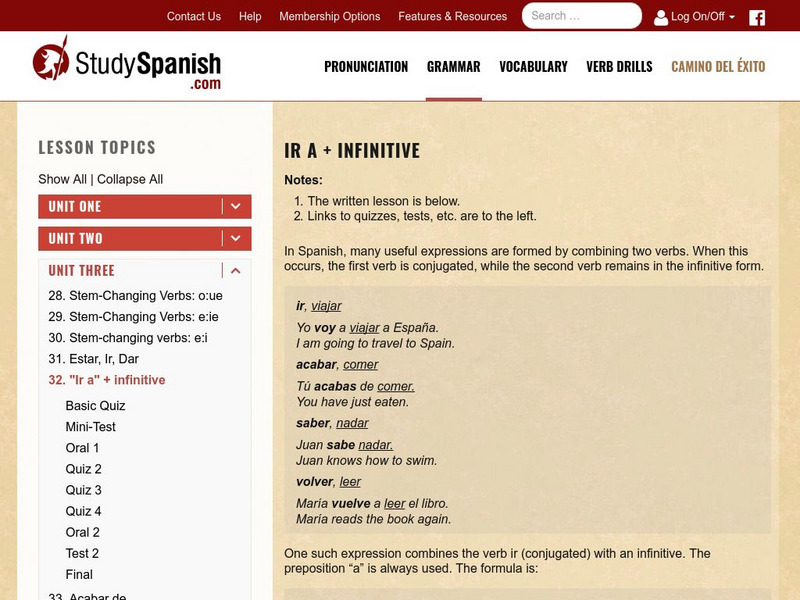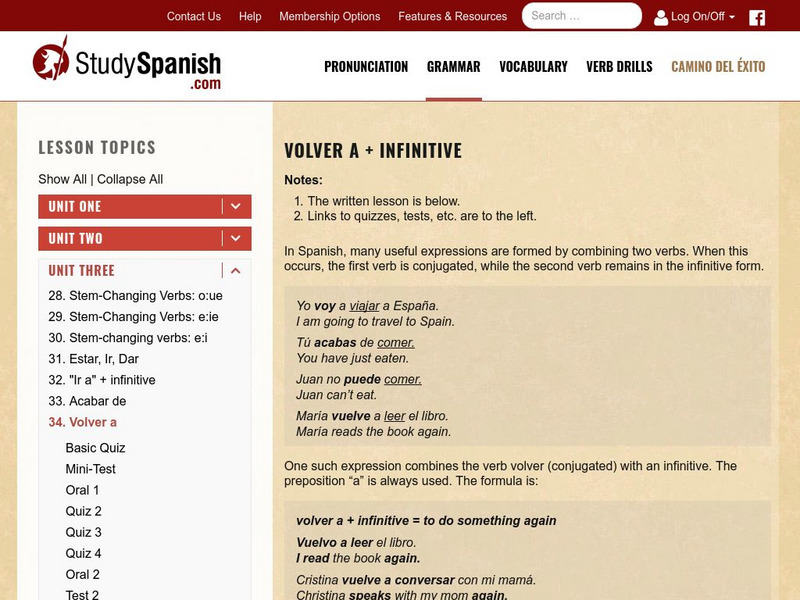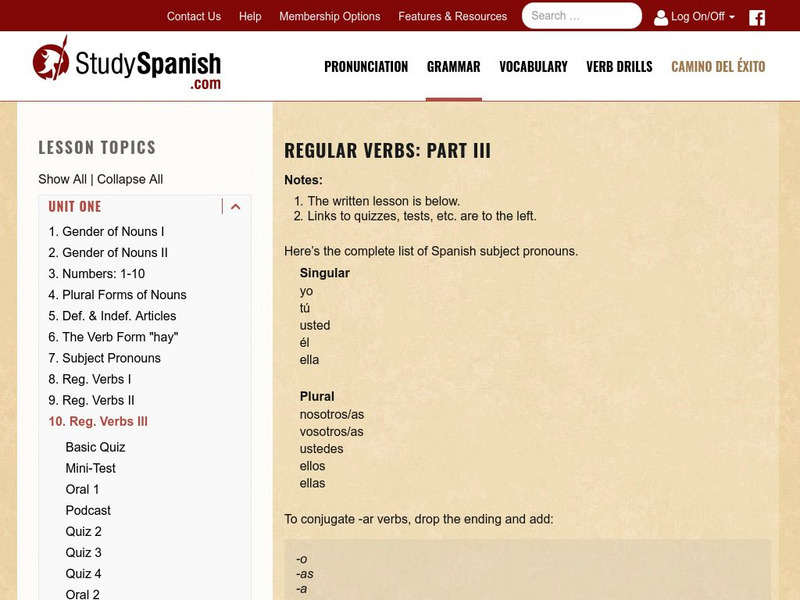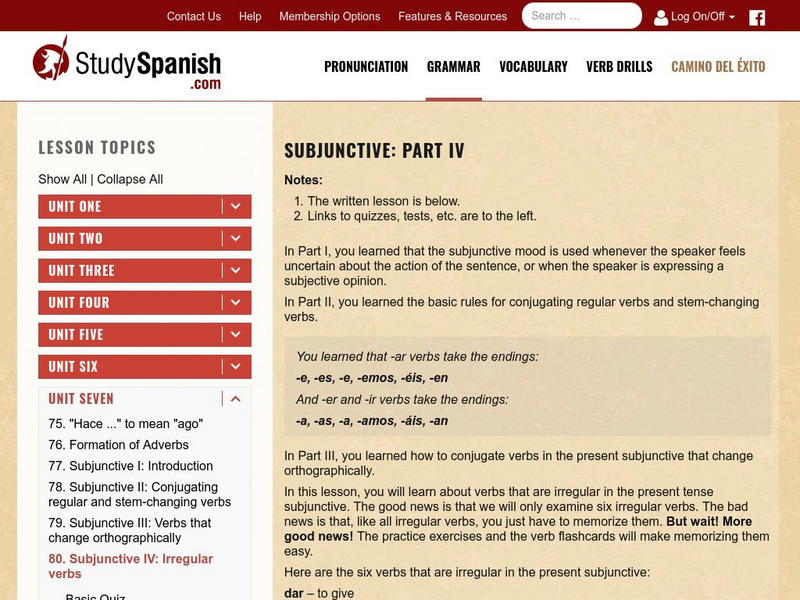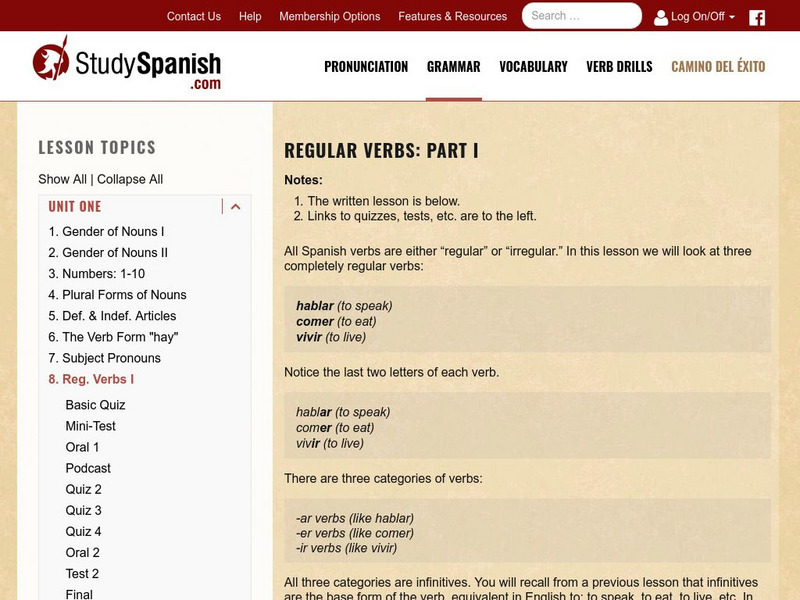Curated OER
Preterite Forms of -AR, -ER, -IR Verbs
Students explore how to form the preterite forms of regular -AR, -ER, and -IR verbs. They complete a variety of written task in which they write the correct preterite forms of the verbs. Students complete a worksheet finding the correct...
Curated OER
Spanish - Imperative vs. Preterite Tense
Twelfth graders take an online quiz using a website where they differentiate between preterite and imperfect tenses in Spanish. For this Spanish lesson plan, 12th graders use their computer skills and Spanish skills.
Curated OER
Vocabulary Development: Numbers
Now that your Spanish speakers know the numbers up to 10, teach them 11-20. This lesson is very straight forward and employs direct instruction, so if your young learners need to move around, select a different lesson plan.
Curated OER
Vowel Stem-Changing Verbs, part 3
These colorful slides will provide your class with great practice conjugating vowel stem-changing verbs. There are a total of twenty-five fill-in-the-blank sentences for your Spanish students to complete. Tip: Use individual white boards...
Curated OER
Matching the Phrases
What is the boy doing? As they study the pictures above, your beginning and intermediate Spanish language learners mark the correct sentences. On the second page, they do the same thing for a different set of pictures. Answers are not...
Curated OER
Gustar
Me gusta, te gusta, y le gusta are different forms of the reflexive verb: gustar. Students can practice using gustar in this PowerPoint by choosing the correct option to fill in the blank of twenty-two sentences. Tip: Assign students...
Curated OER
Question Words 4
Wow! Seventy-four slides of fill-in-the-blank sentences will provide your students with ample practice using question words: que, cual, quien cuantos, and more! Tip: Use name sticks to call on students to complete these sentences.
Curated OER
Future Tense: Regular and Irregular Verbs #1
The next tense your class must master: the future tense! Use this simple activity as an exit ticket out of class. After introducing the future tense and how it's conjugated, provide your class with this activity to assess their...
Curated OER
Present Tense: All Verbs
Present your class with this bell-ringer activity to review conjugating verbs in the present tense. It's short and sweet, but no answers are provided.
Curated OER
Lectura Treinta y Dos: el lobo
Intermediate Spanish classes read a few paragraphs about two campers, their sled dogs, and a pack of curious wolves. Assess their reading comprehension with the seven questions that follow. The final question encourages readers to draw...
Curated OER
Types of Tranportations
Students practice saying the different types of transportations. They review personal pronouns and write sentences about a form of transportation.
Curated OER
Bilinguilism and Spanglish: A Way of Speaking, a Way of Thinking
Students compare the differences between bilingualism and registers of discourse. They investigate how economic, historical and interpersonal relationships affect language and relationships.
Curated OER
Spanish II
Students listen actively to the teacher go over the note sheet and copy down other important information not on the sheet and ask questions about what they do not understand. They then use this information to help them complete...
Curated OER
Buen vs. Bien
Should you use buen or bien? These two are often confused! Give your learners these 32 sentences to test their understanding of both words.
Curated OER
Find the Matching Sentence
Use this as a time-filler to practice translating simple Spanish sentences. For each of the three pictures shown, Spanish language learners must choose the sentence that describes the picture. Directions and answers are not included.
Curated OER
La Lengua de las Jarchas
Students discover the non-Arabic language used in the composition of the jarchas.
Study Languages
Study Spanish: Ir a + Infinitive
Good introductory lesson to the use of "ir a" to indicate future events. A list of adverbs that denote future time periods may also prove useful. "Poder", "acabar de", and "volver a" are introduced as other double verb constructions. A...
Study Languages
Study Spanish: Volver a + Infinitive
Good introductory lesson to the use of "volver a". "Poder", "ir a", and "acabar de" are also introduced as other double verb constructions. A quiz, oral exercize, and short test at the end of the lesson tests the student's mastery of...
Study Languages
Study Spanish: Regular Verbs Part Iii
The third in a series of three lessons,that focus on regular verbs in the present tense. Fantastic summary of regular present tense conjugations and the use of subject pronouns. The explanation is thorough and easy to understand. The...
Study Languages
Study Spanish: Subjunctive: Irregular Verbs
Great explanation of how to conjugate the six irregular verbs in the present subjunctive: dar, estar, haber, ir, saber, and ser. A quiz at the end of the lesson tests the student's mastery of irregular conjugations in the present...
Language Guide
Language Guide: Er/ Ir Ending Verbs
This verb conjugation site models the correct formation for regular present tense -er/-ir verb. Included is the correct Spanish pronunciation for each verb form which can be heard by click on the audio icon. Under the box is a link to...
Language Guide
Language Guide: Er/ Ir Ending Verbs
This verb conjugation lesson models the correct formation for regular present tense -er/-ir verb. Included is the correct Spanish pronunciation for each verb form which can be heard by click on the audio icon. Under the box is a link to...
Study Languages
Study Spanish: Preterite Part 2
This site is an introduction to four common irregular verbs in the preterite tense: ser, ir, dar, and hacer. A quiz at the end of the lesson tests the student's mastery of these irregular conjugations.
Study Languages
Study Spanish: Regular Verbs Part I
This introduction to conjugating verbs is the first in a series of three lessons,that focus on regular verbs in the present tense. This lesson teaches conjugations that correspond to the pronouns "yo", "nosotros", "usted", and "ustedes"....
















